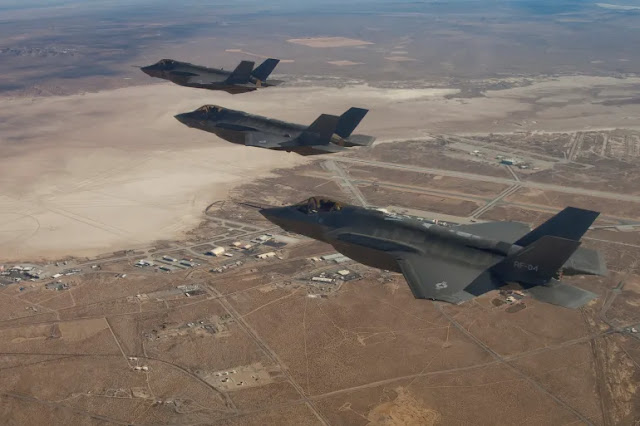In a significant escalation of tensions in the Western Hemisphere, the United States is reportedly contemplating military strikes targeting drug cartels operating in Venezuela, a move that coincides with the deployment of advanced F-35 warplanes to the region. This development, as reported by Linda Ikeji’s Blog on September 6, 2025, underscores the growing concern within the U.S. government about the nexus of narco-trafficking, political instability, and regional security threats emanating from Venezuela. The potential for military action, combined with the strategic deployment of cutting-edge military assets, signals a new chapter in U.S. foreign policy toward the crisis-ridden South American nation. This article provides an in-depth exploration of the situation, analyzing the motivations behind the U.S. considerations, the implications of F-35 deployments, the broader geopolitical context, and the potential consequences for Venezuela and the region.
Background: The Venezuelan Crisis and the Rise of Drug Cartels
Venezuela, once one of Latin America’s wealthiest nations due to its vast oil reserves, has been mired in a profound political, economic, and humanitarian crisis for over a decade. The collapse of its economy, triggered by mismanagement, corruption, and plummeting oil prices, has led to hyperinflation, widespread poverty, and a mass exodus of millions of Venezuelans. Under the leadership of President Nicolás Maduro, whose regime has been accused of authoritarianism and human rights abuses, Venezuela has become a hotspot for illicit activities, including drug trafficking.
Drug cartels have thrived in this environment of political instability and economic desperation. Venezuela’s strategic location, with access to Caribbean and Atlantic shipping routes, has made it a key transit point for cocaine and other narcotics originating from South America and destined for markets in North America, Europe, and beyond. The involvement of high-ranking Venezuelan officials, military personnel, and state-affiliated groups in narco-trafficking—often referred to as the “Cartel of the Suns”—has further complicated the situation. This nexus of crime and governance has drawn the attention of the United States, which views Venezuela’s drug trade as a direct threat to its national security and regional stability.
The U.S. has long maintained sanctions against the Maduro regime, targeting individuals and entities involved in corruption and drug trafficking. However, these measures have had limited success in curbing the activities of cartels or weakening Maduro’s grip on power. The consideration of military strikes represents a dramatic shift in approach, signaling a willingness to use kinetic force to disrupt the operations of drug cartels and, potentially, to send a message to the Venezuelan government.
The F-35 Deployment: A Show of Force
The deployment of F-35 warplanes, among the most advanced fighter jets in the U.S. arsenal, to the region is a clear indication of the seriousness with which the U.S. is approaching the situation in Venezuela. The F-35, developed by Lockheed Martin, is a family of single-seat, single-engine, all-weather stealth multirole fighters designed to perform ground attack and air superiority missions. Its advanced stealth capabilities, sensor fusion, and network-enabled operations make it a formidable asset in modern warfare.
While the exact location of the F-35 deployment was not specified in the report, it is likely that the warplanes are being stationed at U.S. military bases in the Caribbean, such as those in Puerto Rico or Guantanamo Bay, or at allied bases in countries like Colombia, which shares a border with Venezuela and has been a key partner in U.S. counter-narcotics efforts. The deployment serves multiple purposes: it enhances the U.S. military’s ability to conduct surveillance and intelligence-gathering operations in the region, projects power to deter potential adversaries, and positions assets for rapid response should military strikes be authorized.
The timing of the F-35 deployment is significant, as it coincides with heightened rhetoric from U.S. officials about the need to address the growing influence of drug cartels in Venezuela. The presence of these advanced warplanes sends a strong signal to both the Maduro regime and the cartels that the U.S. is prepared to take decisive action. However, it also raises questions about the scope and nature of the potential military operations, as well as their legal and diplomatic ramifications.
Motivations Behind U.S. Considerations for Strikes
The U.S. government’s contemplation of military strikes on Venezuelan drug cartels is driven by a combination of security, political, and humanitarian concerns. At the forefront is the threat posed by the drug trade to the United States and its allies. The flow of narcotics from Venezuela contributes to the opioid crisis in the U.S., fuels organized crime, and destabilizes neighboring countries such as Colombia, Brazil, and the Caribbean nations. By targeting cartel infrastructure—such as drug labs, airstrips, and trafficking routes—the U.S. aims to disrupt the supply chain and weaken the financial networks that sustain these criminal organizations.
Politically, the consideration of military action reflects the U.S.’s frustration with the lack of progress in resolving the Venezuelan crisis through diplomatic and economic means. The Maduro regime has resisted international pressure to hold free and fair elections, release political prisoners, or address the humanitarian crisis. The U.S., along with dozens of other countries, recognizes opposition leader Juan Guaidó as Venezuela’s interim president, but his influence has waned in recent years, leaving the U.S. with few viable options to effect change. Military strikes, while risky, could serve as a means of exerting pressure on Maduro while directly targeting the cartels that prop up his regime.
From a humanitarian perspective, the U.S. sees the drug trade as exacerbating Venezuela’s already dire situation. The profits from narco-trafficking enrich corrupt officials and cartels while ordinary Venezuelans suffer from food shortages, lack of medical care, and rampant violence. By disrupting cartel operations, the U.S. hopes to weaken the economic underpinnings of the Maduro regime and create conditions for political change, though the feasibility of this outcome remains uncertain.
Geopolitical Implications: A Delicate Balancing Act
The prospect of U.S. military strikes in Venezuela raises complex geopolitical questions, particularly given the country’s alliances with powers like Russia, China, and Iran. These nations have provided economic and military support to the Maduro regime, including arms sales, oil investments, and diplomatic backing. Any U.S. military action risks provoking a response from these global players, potentially escalating tensions in an already volatile region.
Russia, in particular, has been a vocal supporter of Maduro, supplying military equipment and advisors to Venezuela. A U.S. strike on Venezuelan soil could be perceived as a direct challenge to Russian interests, potentially leading to retaliatory measures in other theaters, such as Eastern Europe or the Middle East. Similarly, China, which has significant economic investments in Venezuela’s oil sector, may view U.S. military action as a threat to its regional influence. Iran, which has deepened ties with Venezuela through oil shipments and other forms of cooperation, could also respond unpredictably.
Regionally, the U.S. must navigate its relationships with Latin American countries, many of which are wary of U.S. interventionism due to historical precedents like the invasions of Panama and Grenada. Colombia, a key U.S. ally, would likely support efforts to curb drug trafficking, as it has borne the brunt of Venezuela’s spillover effects, including refugee flows and cross-border crime. However, other nations, such as Brazil and Mexico, may be more cautious, fearing that military action could destabilize the region further and lead to a surge in migration or violence.
The deployment of F-35s also complicates the regional dynamic. While the warplanes enhance the U.S.’s operational capabilities, they could be seen as an escalation by Venezuela and its allies, prompting them to bolster their own military posture. Venezuela’s military, though weakened by years of economic decline, still possesses Russian-supplied air defense systems, which could pose a challenge to U.S. operations. The risk of miscalculation or unintended escalation is high, particularly in a region already fraught with tension.
Legal and Ethical Considerations
The consideration of military strikes raises significant legal and ethical questions. Under international law, any use of force on another country’s territory must be justified, typically through self-defense or authorization by the United Nations Security Council. The U.S. could argue that strikes on drug cartels are justified under the principle of self-defense, given the direct threat posed by narco-trafficking to U.S. national security. However, such an argument would likely face scrutiny, particularly if civilian casualties or infrastructure damage occur.
Ethically, the potential for collateral damage is a major concern. Drug cartels often operate in populated areas, using civilians as shields or blending into communities to avoid detection. Precision strikes, even with advanced technology like the F-35, carry the risk of civilian casualties, which could inflame anti-American sentiment in Venezuela and across Latin America. The U.S. would need to carefully weigh the humanitarian costs of military action against the potential benefits of disrupting cartel operations.
Furthermore, the involvement of Venezuelan officials in the drug trade complicates the targeting process. Striking cartel infrastructure could inadvertently target state-affiliated actors, effectively constituting an act of war against the Venezuelan government. Such an outcome could have far-reaching consequences, including the potential for a broader conflict or a humanitarian crisis as the Maduro regime retaliates against perceived domestic threats.
Potential Scenarios and Outcomes
Several scenarios could unfold depending on the U.S.’s next steps. In the most limited scenario, the U.S. could opt for targeted airstrikes on cartel infrastructure, such as drug labs or airstrips, using precision-guided munitions to minimize collateral damage. Such strikes would aim to disrupt the drug trade without directly engaging the Venezuelan military. The F-35s, with their stealth and precision capabilities, would be well-suited for this mission, allowing the U.S. to strike quickly and withdraw before a significant response could be mounted.
A more ambitious scenario would involve a broader campaign targeting not only cartels but also key figures within the Maduro regime implicated in narco-trafficking. This approach would carry greater risks, including the possibility of direct confrontation with Venezuelan forces or their international allies. It could also trigger a domestic crackdown by Maduro, further exacerbating the humanitarian crisis.
Another possibility is that the U.S. uses the threat of military action as a diplomatic tool to pressure Maduro into negotiations or reforms. The deployment of F-35s and the public discussion of strikes could be intended to signal resolve without necessarily committing to kinetic action. This approach would align with the U.S.’s broader strategy of combining military posturing with sanctions and diplomacy to achieve its objectives.
The outcomes of any military action are uncertain. While strikes could disrupt cartel operations in the short term, the drug trade is notoriously resilient, with new actors often filling the void left by dismantled organizations. Moreover, military action is unlikely to address the root causes of Venezuela’s crisis, such as economic collapse and political repression. Without a comprehensive strategy that includes humanitarian aid, diplomatic engagement, and support for democratic institutions, military strikes risk being a temporary fix with long-term consequences.
The Role of Regional and International Actors
The U.S.’s considerations for military action must be viewed in the context of broader regional and international dynamics. Latin American countries, many of which are dealing with their own drug trafficking and security challenges, will be closely watching the U.S.’s actions. Colombia, which has a long history of cooperation with the U.S. on counter-narcotics, could play a critical role in supporting intelligence-gathering and logistical efforts. However, Colombia’s own peace process and domestic challenges may limit its willingness to be seen as a direct participant in U.S. military operations.
The Organization of American States (OAS) and other regional bodies could also influence the trajectory of the situation. The OAS has repeatedly condemned the Maduro regime’s actions and called for democratic reforms, but its members are divided on the issue of foreign intervention. Any U.S. military action would need to be carefully coordinated with regional partners to avoid alienating key allies.
On the international stage, the positions of Russia, China, and Iran will be critical. These countries have vested interests in maintaining their influence in Venezuela and may seek to counter U.S. actions through diplomatic, economic, or military means. The United Nations, while unlikely to authorize military action due to vetoes from Russia and China, could serve as a forum for debate and negotiation.
The Humanitarian Dimension
The Venezuelan crisis is, at its core, a humanitarian tragedy. Over 7 million Venezuelans have fled the country since 2015, creating one of the largest refugee crises in the world. Those who remain face acute shortages of food, medicine, and basic services, with millions living in extreme poverty. The drug trade, while a symptom of the broader crisis, exacerbates these challenges by fueling violence and corruption.
Any U.S. military action must consider the humanitarian implications. Strikes that disrupt cartel operations could inadvertently worsen conditions for civilians, particularly if they lead to increased violence or displacement. The U.S. would need to work closely with international organizations, such as the United Nations and the International Committee of the Red Cross, to mitigate these risks and provide aid to affected populations.
Furthermore, the U.S. could use the threat of military action as leverage to push for greater humanitarian access to Venezuela. The Maduro regime has often restricted the delivery of aid, citing sovereignty concerns. A combination of military pressure and diplomatic engagement could create openings for humanitarian organizations to reach those in need.
Domestic and International Reactions
The consideration of military strikes is likely to provoke strong reactions both within the U.S. and internationally. Domestically, the Biden administration (or its successor, depending on the timing) will face scrutiny from Congress and the public. Critics may argue that military action is an overreach, particularly given the U.S.’s mixed track record with interventions in Latin America. Supporters, however, may view it as a necessary step to address a clear and present danger to national security.
Internationally, the reaction will depend on the scope and execution of any strikes. Allies like Colombia and Canada may express cautious support, while countries like Mexico and Brazil may urge restraint. Venezuela’s allies, particularly Russia and China, are likely to condemn any U.S. action as a violation of sovereignty, potentially escalating tensions in other global hotspots.
Conclusion: A High-Stakes Decision
The United States’ contemplation of military strikes on Venezuelan drug cartels, coupled with the deployment of F-35 warplanes, represents a pivotal moment in the ongoing Venezuelan crisis. The decision to pursue military action carries significant risks, including the potential for escalation, collateral damage, and diplomatic fallout. However, it also reflects the U.S.’s determination to address the growing threat posed by narco-trafficking and the broader instability in Venezuela.
As the U.S. weighs its options, it must balance the immediate need to disrupt cartel operations with the long-term goal of fostering stability in Venezuela and the region. A comprehensive strategy that combines targeted military action, diplomatic engagement, and humanitarian aid is likely to be the most effective approach. The deployment of F-35s signals that the U.S. is prepared to act decisively, but the path forward requires careful consideration of the complex political, legal, and humanitarian dynamics at play.
For Venezuela, a country battered by years of crisis, the prospect of U.S. military intervention adds another layer of uncertainty. The Maduro regime, the cartels, and the Venezuelan people all stand to be affected by the U.S.’s decisions in the coming months. As the world watches, the stakes could not be higher for Venezuela, the region, and the global fight against narco-trafficking.






